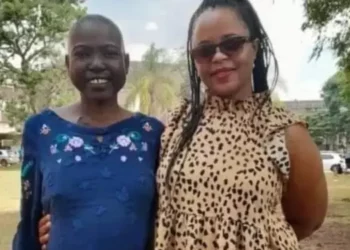In a deeply troubling story, Susan Njoki bravely narrates her traumatic experience in Saudi Arabia, shedding light on the harsh realities faced by migrant hustlers.
Njoki, seeking to escape mistreatment over delayed wages and abuse, found herself subjected to unthinkable cruelty by her Saudi Boss.
Her ordeal began innocently enough when she was asked to dispose of trash one evening. Determined to escape, Njoki wore additional clothing beneath her uniform.
However, her attempt was thwarted as her employer, equipped with a hidden camera in her room, discovered the ploy.
When Njoki resisted bringing the discarded trash back inside, she became the victim of a brutal assault.
The situation escalated when Njoki was forcibly confined in a large freezer typically used by the family to store meat.

The freezer, switched on by her employer, became a prison of unbearable conditions.
Stranded without food or water, Njoki pleaded for release, offering to work without pay just to escape the freezing confinement.
Shockingly, her appeals for mercy fell on deaf ears as her employer callously neglected her.
Even the employer’s own children, witnessing Njoki’s plight, begged their mother to release her from the icy captivity.
Despite their pleas, the employer remained unmoved, showcasing a chilling lack of empathy.
To secure her freedom, Njoki resorted to a desperate measure—feigning mental instability.
It was a harrowing strategy born out of sheer desperation, emphasizing the extreme lengths to which she had to go to escape the torment inflicted upon her.
This shocking incident raises urgent questions about the treatment of migrant workers in Saudi Arabia and the need for strict measures to protect their rights.
Njoki’s story serves as a stark reminder that exploitation and abuse have no place in a world that claims to value equality and human dignity.
As this news reverberates, it is crucial to reflect on the broader issue of migrant worker rights globally.

The international community must come together to condemn such acts of cruelty and advocate for justice for Susan Njoki and others who may be suffering in silence.
This account demands immediate attention and action, urging authorities to investigate and hold the perpetrator accountable.
In sharing this story, we hope to contribute to the ongoing dialogue surrounding migrant worker rights and bring about positive change in the treatment of individuals who seek employment abroad.
Please share this article to amplify Susan Njoki’s voice and join the call for justice.
Together, we can make a difference in the lives of those who have endured unimaginable hardship.




































